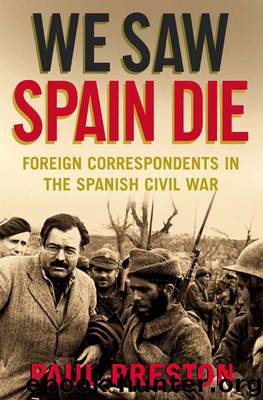We Saw Spain Die by Preston Paul

Author:Preston Paul
Language: eng
Format: epub
ISBN: 9781780337425
Publisher: Constable & Robinson
8
The Sentimental Adventurer: George Steer and the Quest for Lost Causes
In early 1938, Martha Gellhorn wrote to her friend and mentor, Eleanor Roosevelt:
You must read a book by a man named Steer: it is called the Tree of Gernika. It is about the fight of the Basques – he’s the London Times man – and no better book has come out of the war and he says well all the things I have tried to say to you the times I saw you, after Spain. It is beautifully written and true, and few books are like that, and fewer still that deal with war. Please get it.1
Martha Gellhorn’s judgement has more than stood the test of time. Steer was the correspondent of The Times whose account of the bombing of Guernica perhaps had more political impact than any single article written by any correspondent during the Spanish Civil War. The Labour Member of Parliament for Derby, Philip Noel-Baker, wrote to Steer about his reporting:
Your telegrams from Bilbao have been of incalculable value to me, and your messages to the Times have been simply brilliant. I think no article in modern times has made so deep an impression throughout the whole country as your dispatch about the bombing of Guernica. I wish you could have heard the comments made by your Member of Parliament, Arthur Salter. I have quoted the dispatch at length in at least ten big meetings throughout the country, and it everywhere makes a tremendous impression.2
To a world which has witnessed the slaughter unleashed by Hitler and Stalin, to say nothing of the Korean, Vietnam and Iraq wars, the Spanish Civil War might well seem small beer. After Dresden and Hiroshima, the destruction of Guernica could appear to be no more than a second-rate piece of thuggery. Yet, for all that, the bombing of the sleepy Basque market town on 26 April 1937 has probably provoked more savage polemic than any single act of war since, and much of that polemic has revolved around Steer’s article. This is partly because what happened at Guernica was perceived as the first time that aerial bombardment wiped out an undefended civilian target in Europe. In fact, the bombing of innocent civilians was a well-established practice in the colonies of the Western powers and had most recently and most thoroughly been carried out by the Italians in Abyssinia. Even in Spain, the bombing of Guernica had been preceded by the destruction of nearby Durango by German bombers at the end of March 1937. As the special envoy of The Times with the Republican forces in Bilbao, George Steer, who had witnessed the horrors of bombing in Abyssinia, described what was done at Durango as ‘the most terrible bombardment of a civil population in the history of the world up to March 31st 1937’.3 However, with the aid of Picasso’s searing painting, it is Guernica that is now remembered as the place where the new and horrific modern warfare came of age.
It has
Download
This site does not store any files on its server. We only index and link to content provided by other sites. Please contact the content providers to delete copyright contents if any and email us, we'll remove relevant links or contents immediately.
Asking the Right Questions: A Guide to Critical Thinking by M. Neil Browne & Stuart M. Keeley(5765)
Autoboyography by Christina Lauren(5228)
Eat That Frog! by Brian Tracy(4527)
Dialogue by Robert McKee(4390)
Sticky Fingers by Joe Hagan(4190)
Journeys Out of the Body by Robert Monroe(3621)
Annapurna by Maurice Herzog(3464)
Full Circle by Michael Palin(3443)
Schaum's Quick Guide to Writing Great Short Stories by Margaret Lucke(3376)
Elements of Style 2017 by Richard De A'Morelli(3343)
The Art of Dramatic Writing: Its Basis in the Creative Interpretation of Human Motives by Egri Lajos(3063)
Atlas Obscura by Joshua Foer(2955)
Why I Write by George Orwell(2945)
The Fight by Norman Mailer(2930)
The Diviners by Libba Bray(2928)
In Patagonia by Bruce Chatwin(2922)
The Mental Game of Writing: How to Overcome Obstacles, Stay Creative and Productive, and Free Your Mind for Success by James Scott Bell(2906)
Venice by Jan Morris(2570)
The Elements of Style by William Strunk and E. B. White(2470)
